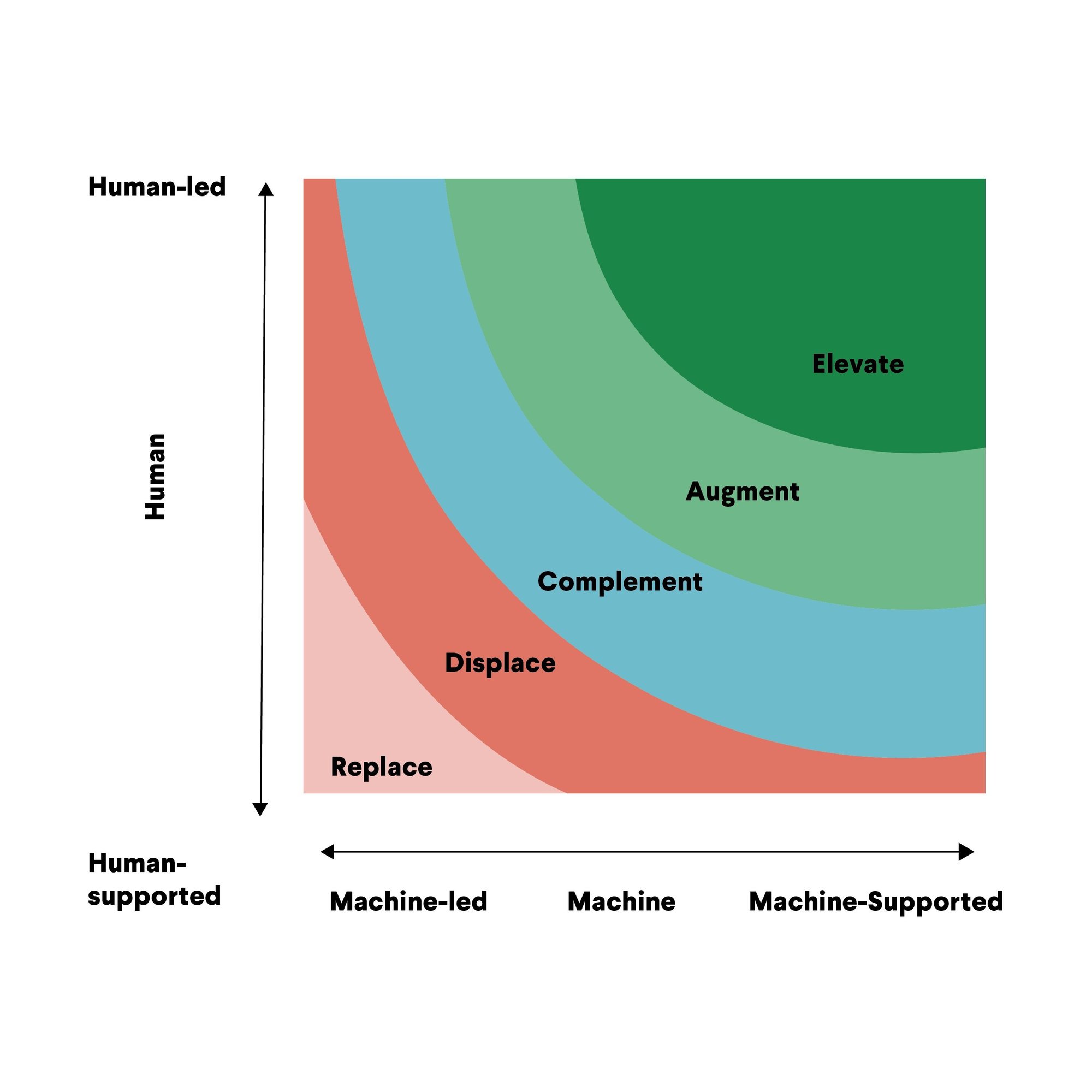The AI-Ready Workforce
How Leaders and Workers Can Prepare for a Reshaped Future of Work
Get the report sent to your inbox
About the Report
- New research from JFF shows AI’s impact on jobs will depend on whether AI increases or decreases the need for a particular skill or task, and how important those tasks and skills are to a given occupation or industry.
- JFF’s The AI-Ready Workforce report offers three new resources—a framework model, industry-specific profiles, and a readiness blueprint—to anticipate coming shifts across industries and occupations, and help workers, institutions, and ecosystems prepare.
- The bottom line: every occupation will benefit by doubling down on the uniquely human interpersonal skills that will be elevated or augmented by AI.
Three New Readiness Resources From JFF
Jobs for the Future’s (JFF) Center for Artificial Intelligence & the Future of Work, incubated within JFF’s innovation lab, JFFLabs, collaborated with Intel Corporation, a leader in advancing AI technology responsibly, to craft a new set of resources for thinking—and planning—today for the complex ways in which AI will transform jobs tomorrow. Drawing on an in-depth analysis of labor market data and surveys of business, workforce, and education leaders, we created three new resources.
The AI-Ready Workforce Framework
A New Model for AI’s Dynamic Impact on Tasks and Skills
Our new AI-Ready Workforce Framework analyzes tasks and skills based on how much or how little AI-driven automation may impact them and the nature of that impact. Organized into five groups (replace, displace, complement, augment, and elevate), this framework suggests whether the integration of AI is likely to increase or decrease workers’ use of certain skills.
Building on our recognition that AI will affect types of tasks and skills differently, our team developed The AI-Ready Workforce Framework to project how AI operates within in-demand jobs and industries critical to economic advancement in the United States.
Extending the foundation laid by existing research on task automation and leveraging the O*NET skills database, the World Economic Forum (WEF) global skills taxonomy, and Lightcast’s open skills taxonomy, the Framework establishes five types of AI impact for clusters of tasks and skills that commonly occur across in-demand jobs.

Transformation Profiles
Reshaping Industries and Occupations to Center Human Skills
While it’s clear that AI will impact different jobs and industries differently, we were eager to better understand how that impact would play out within key industries in the U.S. economy—and what actions leaders should take to anticipate and respond to these shifts.
The AI-Transformation Profiles examine the relative importance within U.S. industries and occupations of tasks and skills whose use could be increased or decreased by AI. Each profile, which we developed at the industry level as an example for one occupation, describes four categories of action—Future-Proof, Capitalize, Automate, and Reimagine—that employers, educators, workforce development partners, and workers themselves can begin to take to emphasize or deemphasize certain tasks and skills, reshape jobs, and teach workers new skills to respond to these shifts.
What we found was striking: while tasks and skills that will be displaced by AI are important or very important to 98% of the top 10 highest-employment occupations across these 5 key U.S. industries, 78% of these jobs value uniquely human Elevate tasks and skills as very important or important—and for the remaining 22%, Elevate tasks and skills are at least somewhat important.
Readiness Blueprint
Recommendations and Key Strategies for Policy Leaders, Employers, and Postsecondary Institutions
We developed a new blueprint for workforce transformation, offering new, overarching recommendations and key strategies for policy leaders, employers, and postsecondary institutions and training organizations.
With humans at the center, we map out critical steps for workers, institutions (including employers and education and workforce development organizations), and ecosystems to ensure that all of us are equitably prepared for the coming AI transformation.
-
Preparing Humans
- Universal AI Literacy: Offer foundational awareness-building and training in core AI concepts, tools, and skills, including benefits and pitfalls, for every learner and worker. This includes lifelong learning and continuous skilling in AI as well as enhancement of durable, resilient human skills.
- Worker Voice and Engagement: Support and encourage worker experimentation with AI technology to uncover innovative use cases; ensure workers have the agency to adopt and learn from those innovations and that promising ideas get attention from leaders.
-
Preparing Institutions
- Organization Culture and Leadership: Cultivate organizational cultures that readily anticipate, accept, and adapt to technology-driven change and prioritize both innovation and support for workers.
- Industry-Specific Training and Upskilling Strategy: Embed industry- and occupation-specific AI literacy learning in training and curriculum at all levels; focus in-depth on Elevate and Augment skills in education and training; expand pathways for AI talent.
- Technology Infrastructure: Upgrade technology infrastructure and systems to both responsibly and transparently integrate AI use cases into day-to-day work and assess their impact.
- Data and Evaluation: Engage next-generation labor market intelligence, including upgraded labor market signals, on how AI is reshaping job/skill demand and the talent landscape.
-
Preparing Ecosystems
- Workforce Planning: Create systems, tools, platforms, and practices that support assessment and reshaping of jobs and training pathways to prepare for ongoing AI-driven evolution. Include flexible, human-centered job profiles and support for job-crafting strategies by workers and frontline managers to respond to shifts; accelerate adoption of skills-first hiring and talent mobility practices.
- Policy: Support public policies for business and workforce systems transformation, new skill and talent development offerings, and in-transition workers.
- Public and Private Investment: Invest in AI and related technology deployment and upskilling to capitalize on new jobs and industries created by AI.
- Education-to-Career Systems: Collaborate between public and private partners, including training providers, employers, workforce intermediaries, learners, and workers to assess talent needs and co-create skills development offerings and pipelines; engage cross-industry collaboration on AI-workforce development.
Our Opportunity
The explosion of artificial intelligence across industries and occupations will create some of the most exciting opportunities—and some of the biggest challenges—we’ve ever faced.
Yet there’s also significant potential for AI to exacerbate existing inequities, deepen digital divides, and degrade opportunities for workers and learners. That’s not a version of the future we are willing to accept. Ensuring that every learner and worker is prepared with foundational AI awareness and skills will put the power and potential of AI directly into their hands, yield benefits for employers, and keep our economy competitive.
Get the report sent to your inbox.
Get your copy now“In an era in which everything – the way we live, work, connect, and learn – is becoming more digital, it is critical to understand the impact of emerging technologies, like AI, on our broader workforce. As AI continues to expand across a wide spectrum of use cases, we believe it should not be limited to benefit only the few with vast resources. Our AI-Ready Workforce report explores how key industries can best prepare for success amid these ongoing transformations. These insights will enable workers, learners, and organizations to prepare and train for the future of work. Together, we can leverage the incredible power of technology to create bigger opportunities and a better future for every person on the planet. The possibilities are endless."
- April Miller Boise, Executive Vice President and Chief Legal Officer at Intel Corporation
Key Collaborator

Intel and the Intel logo are trademarks of Intel Corporation or its subsidiaries.







